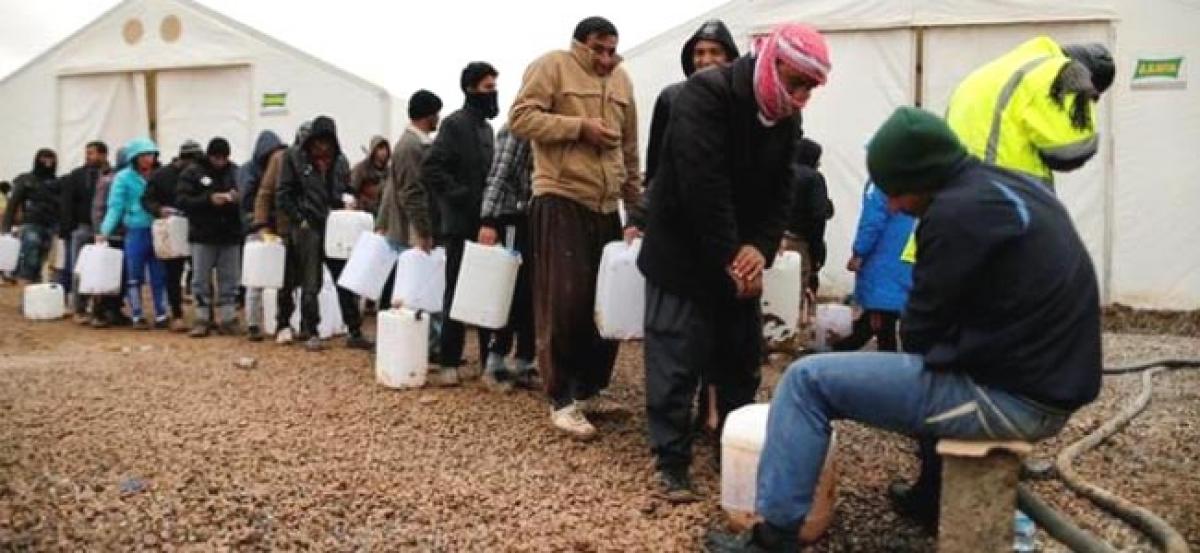Live
- First Impressions and Unboxing of the MacBook Pro M4: A Powerhouse for Professionals and Creators
- China Gears Up for Potential Trade War Amid Trump’s Tariff Threats
- Small Farmers Gain Less by Selling to Supermarkets: Study Reveals
- Why Despite the Controversy, America Is Anticipating the Mike Tyson vs. Jake Paul Fight
- Sanju Samson and Tilak Varma Shine: Record-Breaking Feats in 4th T20I Against South Africa
- India Urges $1.3 Trillion Annual Climate Support for Developing Nations
- Bad air: 106 shuttle buses, 60 extra Metro trips planned to make Delhiites give up cars
- WHO reports declining monkeypox cases in Congo
- CM Attends Kotideepotsavam on Kartika Purnima
- PKL Season 11: Raiding trio of Devank, Ayan, Sandeep help Patna Pirates rout Bengal Warriorz
Just In

Seven-year-old Anas lies in a hospital bed in the northern Iraqi city of Erbil, his little body wrapped in bandages following four surgeries to remove shrapnel that shredded his intestines.
ERBIL, IRAQ: Seven-year-old Anas lies in a hospital bed in the northern Iraqi city of Erbil, his little body wrapped in bandages following four surgeries to remove shrapnel that shredded his intestines.
He is considered lucky for being alive. Two of his brothers did not survive the Islamic State mortar attack three weeks ago on their family's home in Mosul. One boy died immediately, the other after reaching the emergency room.
"I saw them and then I fell to the ground and fainted," Anas said in a strained whisper, sometimes wincing from pain.
At the time of the attack, Anas and his family may well have believed they were finally safe after 2-1/2 years of deprivation and cruelty under the Islamists' hardline rule.
Their house was in an eastern neighbourhood the Iraqi government had declared "liberated" by its forces in their battle to recapture Mosul, Islamic State's last major stronghold in Iraq. But the military's advance has been slow and punishing, and nine weeks in they have retaken just a quarter of the city.
When elite army troops arrived in their districts and the jihadists beat a retreat, many residents fled towards the relative safety of camps outside the city. But a growing number of civilians, like Anas and his brothers, are being dragged back into violence at the moment of their supposed deliverance.
Iraqi authorities do not release statistics about those killed or wounded in the Mosul campaign in an apparent effort to maintain morale, but a month ago the United Nations warned that civilian casualties were overwhelming the capacity of the government and international aid groups operating in the area.
Since then, the situation seems to have deteriorated.
Iraqi security officials at the Erbil hospital where Anas is being treated say dozens of wounded people from the Mosul area arrive each day, and that the majority are civilians. A Kurdish medical official said military personnel make up the larger portion. Reuters could not verify either account but patients at the Emergency Medical Center hospital include both civilians and members of the armed forces.
Relatively peaceful Erbil, just an hour's drive from the frontline, lies in Iraq's autonomous Kurdish region. Its own peshmerga forces have pushed back Islamic State across the north, expanding its territory and becoming a haven for evacuees.
SURVIVING ON PAINKILLERS
Nour, a little girl with blonde hair, sits in a wheelchair at the far end of a ward for women and children. Her left lower leg, concealed by a blanket, is held together by metal pins that stick out several centimetres.
Nour's aunt said her niece was hurt in an air strike two months ago on their village south of Mosul. Both the Iraqi military and a U.S.-led coalition backing Baghdad are bombarding Islamic State in the region.
The international coalition, which is also bombing in Syria, has acknowledged killing 173 civilians since strikes started in 2014, significantly lower than estimates made by other groups.
The doctors say Nour needs surgery abroad, but the cost is prohibitive so for now she subsists on painkillers. Her aunt was permitted to accompany her to the hospital, but her parents and siblings cannot visit because of restrictions on Arabs entering the Kurdish region, which has already accepted more than one million displaced people since Islamic State seized large swathes of the country's north and west in 2014.
As soon as Nour's condition improves she will most likely have to go live in a government-run camp in the Kurdish region or return home despite the continued presence of Islamic State remnants there.
As Nour and her aunt spoke to Reuters, a woman stretched out on a nearby bed began weeping. She was wounded in an explosion last month that killed her husband and blew the legs off her eldest son.
"The army told us to go out to a safe place," she whispered amid sobs. "We hadn't moved even 100 metres and at the third house Daesh (Islamic State) had planted a mine next to the door."
Iraqi security forces wounded in Mosul are stabilised at Erbil hospitals before being airlifted to Baghdad for further treatment. Many of their casualties come from snipers or suicide car bombs.
One soldier from the elite counter-terrorism force was shot in both legs last week. Another was hit by a bomb released from an Islamic State drone, a relatively new addition to the jihadists' improvised arsenal, which took him by surprise.
"'Where did that come from, the sky?'" he remembers thinking about the blast.

© 2024 Hyderabad Media House Limited/The Hans India. All rights reserved. Powered by hocalwire.com







